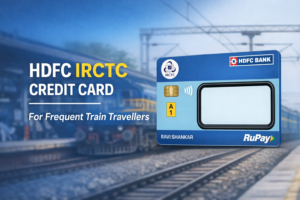Charge Card Vs Credit Card Vs Debit Card: A Comparison
- 17 Oct 25
- 10 mins
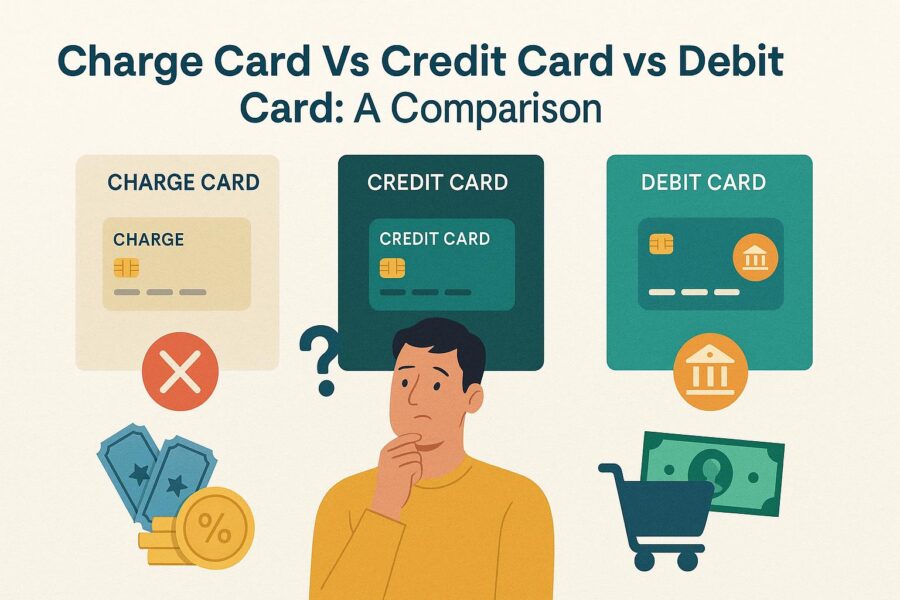
Charge Card Vs Credit Card Vs Debit Card: A Comparison
Key Takeaways
- A charge card draws from a lender but requires full repayment monthly, a credit card borrows from a pre-approved limit with flexible repayment, while a debit card uses your bank account balance directly.
- Charge cards don’t charge interest but demand full repayment; credit cards apply variable interest on unpaid balances; debit cards have no interest unless you use overdraft protection.
- Using a credit card or charge card can affect your credit score depending on repayment and utilisation, while debit cards don’t impact credit history.
- Charge cards usually have no preset spending limit, credit cards have fixed limits based on your income and creditworthiness, and debit card are limited to the available balance in your account.
- Charge cards often come with high annual fees but premium benefits, credit cards charge joining and renewal fees along with potential late fees, while debit cards generally have minimal or no maintenance costs.
Did you know that in India, over 10.80 crore credit cards and more than 979.71 million debit cards are in circulation, but charge cards remain far less common? This is because only a few fully know how these 3 types differ and which one truly fits their financial needs.
Each option, whether a charge card, a credit card or a debit card, comes with unique benefits, repayment rules and spending flexibility. Knowing these differences can help you make smarter choices with your money.
Keep reading as we break down charge card vs credit card vs debit card to see which one is right for you.
8 Differential Factors: Charge Card Vs Credit Card Vs Debit Card
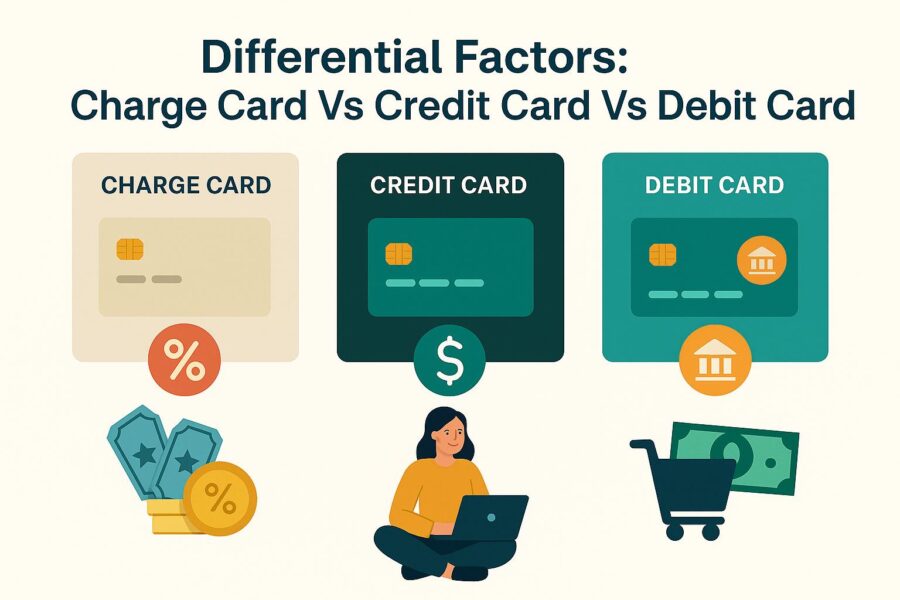
| Factors | Charge Card | Credit Card | Debit Card |
| Use and Purpose | To make a payment later and purchase now | Cardholder can make a payment later and purchase now | To withdraw cash from ATMs |
| Source of Funds | Get money from a lender through a bank | Get credits through a bank | Get money from your bank account |
| Interest Charges | No interest to pay generally because of no carried balance | Variable interest rate to pay, depending on the bank | Zero interest until the occurrence of an overdraft |
| Repayment Structure | Payment of due balance each month | Minimum payment required | Maintenance of the bank balance is required |
| Impact on Credit Score | Credit utilisation ratio is not impacted | High credit utilisation ratio leads to a lower credit score | None |
| Spending Limits | No spending limit generally | Variable spending limit based on the kind of credit card | Spending limit based on bank account balance |
| Benefits | No interest chargesNo firm spending limitFinancial disciplinePremium benefits and rewards | ConvenienceRewards and perksBuilding credit historyEmergency fund | Budget controlConvenienceEasy to getNo interest chargesCash access |
| Drawbacks | Mandatory full repaymentHigh annual feesNo carried balancePenalties for missed payments | High-interest ratesOverspending riskAccumulating debtFees | No credit buildingOverdraft feesLimited rewardsLimited funds |
What is a Charge Card?
A charge card in India allows customers to make purchases but requires them to repay the full amount in one payment within a set period, or a penalty applies. Unlike credit cards, charge cards do not charge interest or impose spending limits.
They are not as widely used in India as credit cards, primarily because many individuals are unaware of this concept. Diners Club International, the company that issues Diners Cards, is believed to have founded the concept of Charge Cards. Other providers of charge cards include Amex, MasterCard, and Visa.
How Does a Charge Card Work?
Charge cards work differently from credit cards. Unlike credit cards, they require users to pay the entire bill every month. For example, if someone spends ₹50,000 or ₹2,00,000 in a month, they must clear the full balance by the due date.
Charge cards also do not have a fixed spending limit. Instead, issuers decide the limit dynamically by reviewing the cardholder’s spending behaviour, repayment history and income level. This flexibility does not mean unlimited spending, but rather an adjustable limit that changes with usage.
Benefits of Using a Charge Card
- You do not have to pay any interest on your charge card.
- There is no fixed spending limit on charge cards.
- It helps in maintaining financial discipline as you have to pay the full balance every month.
- It offers premium benefits and rewards to its customers, such as cashback, travel perks, and more.
Drawbacks of Using a Charge Card
- A charge card is required to make a full repayment upon a month's end.
- It has a high annual fee along with high overdraft fees as well.
- Charge cards do not carry a balance, which means that the money a person uses is borrowed.
- If a person fails to make a full repayment, they need to pay penalties.
What is a Credit Card?
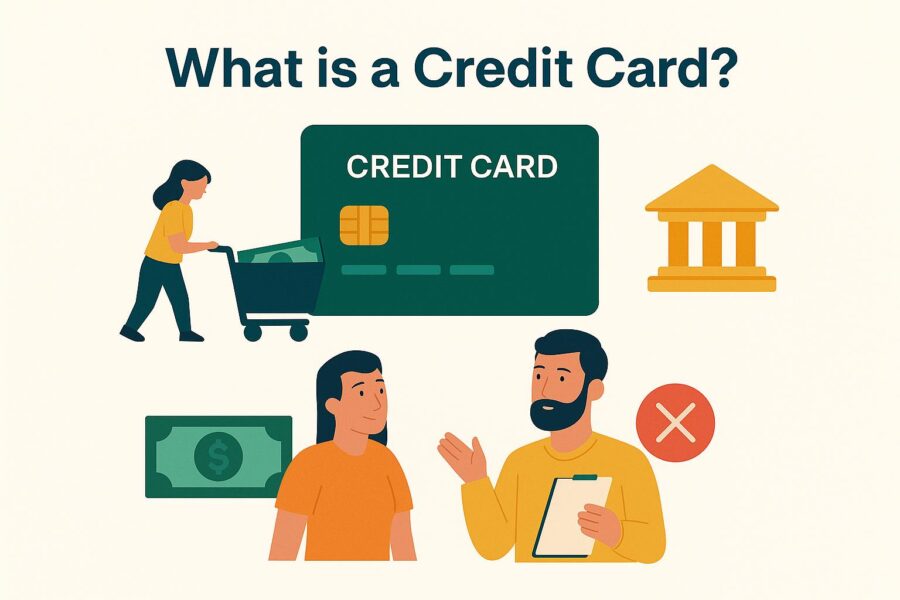
A Credit Card allows individuals to borrow money against a line of credit and repay it monthly with interest. It enables them to purchase products and services, including high-end items, while paying in instalments. However, credit cards impose a spending limit on users.
There are currently more active credit cards than 10.80 crore, as it was the last recorded number in December of 2024 by the Press Trust of India. Since then, the credit card market in India has increased. In future, the average number of credit cards per person in India is expected to rise from 1.5 to 2.5 by 2026 as per RBI Projections 2024.
The top banks that offer credit cards to Indian users are as follows:
- HDFC Bank
- SBI Card
- ICICI Bank
- Axis Bank
- Kotak Mahindra Bank
How does a Credit Card Work?
Credit cards work by giving users a set credit limit, which depends on their income and credit history. For example, a bank may approve a limit of ₹40,000, ₹2,00,000 or even ₹20,00,000. Users can borrow within this limit and repay later.
If they carry forward the balance, the bank charges interest. Banks usually increase the credit limit when customers spend regularly and pay on time. However, if users delay or miss payments, banks may reduce the limit, increase the interest rate on the balance or even cancel the card.
So, when choosing a new card, individuals must compare features carefully. A card may advertise no annual fee but charge very high interest, sometimes as much as 30%.
Benefits of Using a Credit Card
- Credit cards provide convenience with touch and tap features to pay.
- They offer rewards such as extra points for spending a specific amount in a limited time.
- Using a credit card helps in building your credit history, which can be an important financial tool.
- Credit cards can come in handy during emergencies when you do not have cash with you.
Drawbacks of Using a Credit Card
- Credit cards come with high interest rates, which can go above 40% Annual Percentage Rate (APR).
- Since it is very convenient to use a credit card for payment, there is a risk of overspending.
- There are various kinds of hidden fees and charges associated with credit cards.
- There is also a risk of accumulating debt if a person uses their credit card irresponsibly.
💡Pay your credit card bills in an easy and secured way and experience smooth transactions with the PICE App.
What is a Debit Card?
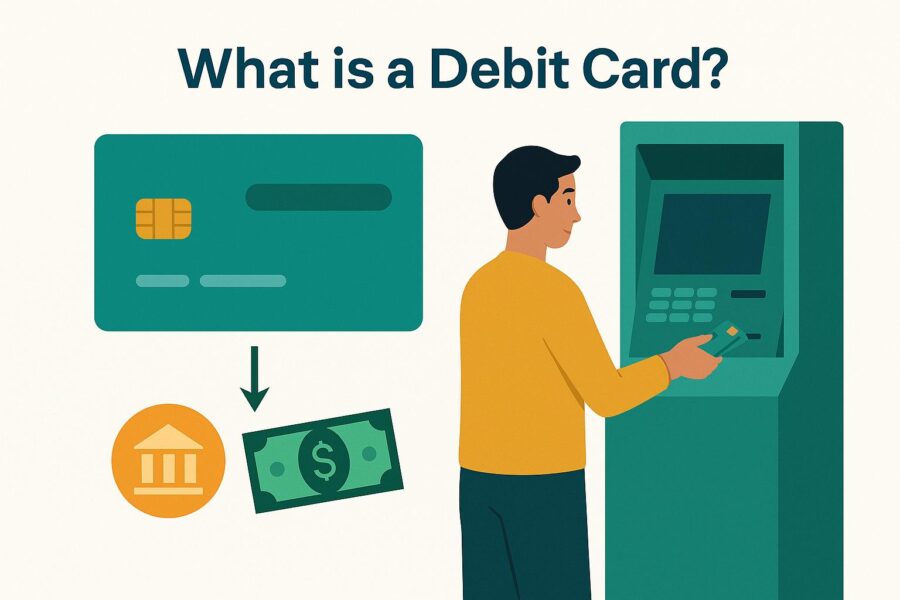
A Debit Card lets customers spend money directly from funds deposited in their bank account. Linked to savings or current accounts, it allows users to withdraw cash, make purchases and pay bills. Banks usually issue debit cards when customers open an account, with common examples being Visa and Mastercard. It has lower fraud protection than credit or charge cards.
In India, a total of 979.71 million active debit cards were recorded in the year 2024. The country has recently seen a fall in the use of debit cards due to the rise in preference for credit cards. All banks in India offer their customers a debit card option while opening a bank account.
How does a Debit Card Work?
Debit cards work by drawing money directly from a user’s linked bank account whenever they make a purchase. For instance, if you buy groceries worth ₹2,000 and use your debit card to pay, the bank immediately deducts that amount from your account. If the balance is insufficient, the payment may fail.
Some banks offer overdraft protection, allowing you to spend a little more, up to ₹5,000 or ₹10,000. They do this by covering the shortfall or transferring money from another linked account.
When used online, debit cards work like credit cards. You enter the card number, expiry date and CVV to complete the payment. Offline, the card functions as an ATM card to withdraw money. Debit cards do not help build a credit history or improve your credit score.
Benefits of Using a Debit Card
- Since a person only gets access to funds in their bank account, debit cards offer budget control.
- Debit cards offer convenience as they can easily be set up on a UPI application.
- Almost all banks in India offer a debit card to their customers when they open their accounts; therefore, it is very easy to get one.
- There is no interest to be paid on debit cards; however, if you overspend, banks have an interest rate on that specific spending.
- You can easily withdraw money from any ATM with the use of a debit card.
Drawbacks of Using a Debit Card
- The use of a debit card does not build credit.
- There are overdraft fees applicable upon exceeding the balance.
- There are few to no rewards that the debit cards offer.
- In most cases, you only have access to limited funds which are in your bank account if you have a debit card.
Charge Card Vs Credit Card Vs Debit Card: Which is Right for You?
Each card comes with its own advantages and disadvantages. Choosing either of these cards totally depends on your purpose or future use. This means that if you earn well and spend a lot and can always afford to pay your balance in full, you should go for a charge card. International charge cards are famously used by businesses.
The primary advantage of having a credit card is that it offers you flexibility and rewards for payment with EMI options. If you are a person who can manage repayments responsibly, you should go for a credit card, as it will also help you build a credit history.
Finally, if you prefer simple and controlled spending, you should go for a debit card. This card is the most easily available, and with it, you can avoid any kind of debt or interest rates.
Conclusion
The choice between a charge card vs credit card vs debit card comes down to your spending habits and repayment capacity. Charge cards demand full repayment but offer premium perks. Credit cards provide flexibility, rewards and credit-building potential, while debit cards ensure control and instant payments from your account. So, always analyse your needs and the card offerings, and then you can decide which card aligns best with your financial goals.
 By
By 















